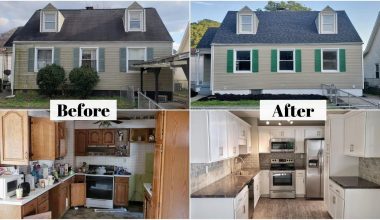It wasn’t long ago that most people sold their first home before buying another. The 1% who had the right connections might own rental property. Today, times have changed, and an increasing number of homeowners are buying a second home and renting out the first to make a little extra money and develop long-term wealth.
While there are some possible advantages to renting out the first home, there are also some disadvantages to consider. In this post, we’ll go over the steps to buying a second home while you rent the first, starting with the primary advantages of retaining a home as a rental rather than selling to an investor.
Where Can I Buy a Second Home?
Choosing where to buy your new home is a big decision. Should you buy a home near your family? Or would you prefer one on a beach, in the mountains, or in your favorite city?
It is critical to consult with your spouse and any other family members who may be involved in this choice. Spend some time investigating the greatest local neighborhoods. Collaborate with a local real estate agent to identify the ideal locations for a second home. Furthermore, this simplifies the initial step of the home-buying process, pre-approval. Conducting preliminary research on your new location, collaborating with a real estate agent in that area, and analyzing your finances inside the new place can demonstrate proactive initiative to your lender as you navigate the mortgage procedure for your second house.
Reasons to Buy a Second Home
There are numerous situations in which a second home makes sense:
- You desire a vacation home, maybe for a frequent break or to someday retire.
- You require a commuter home because you or your partner work too far away from your primary home to make a daily driving or train trip feasible.
- You want to make a real estate investment by buying a second home to rent out or flip.
- You want to move up by buying a new property but maintaining your existing one as a rental.
- You’re buying a home for a family member, possibly to keep your parents close by or to provide a campus-adjacent pad for your college student.
It’s critical to be clear about your intentions because how you use your second home influences your financing options and continuing costs, as well as the location and style of your home.
Buying a condo instead of a detached single-family home may make more sense if you need a commuting home or lodging for your college student. To be a good investment, a rental property or a flip must appeal to tenants or buyers. If you don’t live near the area, managing a vacation home that also serves as a short-term rental may be tricky.
Important Factors To Consider When Buying a Second Home
A second home may be a place to relax on vacation, but owning one is not. You’ll need to budget for additional costs and keep track of how much time you — or anyone who pays to use it — spend there.
- Affordability: If you do not pay cash for your second home, you will have to make a second mortgage payment. Examine your budget carefully to see if the extra monthly cost makes sense for your finances. You’ll also need to budget for additional homeowners insurance, power bills, property taxes, and all the other costs associated with owning a second home.
- Occupancy requirements: If you’re buying a second home, you can consider renting it out when you’re not using it. However, if you rent it out too frequently, your second home may be considered an investment property and may be subject to different rules. If your loan is guaranteed by Fannie Mae or Freddie Mac, the property must be “primarily available for borrower’s personal use and enjoyment” for more than half of the calendar year. The IRS has regulations as well: if you rent out your second home for more than 14 days per year, you must record the rental revenue.
- Location: Buying a second home in a seaside town may seem like a great idea, but if you live a long distance away, getting there may be so difficult that you don’t get there very often. Consider your lifestyle and choose a second home in a location where you will use it on a frequent basis.
- Maintenance: Even if you won’t be spending as much time in your second home, you’ll still have to pay for maintenance. The HVAC system will need to be replaced later, and the home may require a new roof. The exterior will also require upkeep (think lawn mowing and snow removal), so if you aren’t there frequently, you should budget for a maintenance company to manage it.
Steps To Buying a Second Home While Renting the First
While there are various advantages to renting out the first home, having two properties is something to consider carefully. Here are the five fundamental procedures for buying a second home while renting out the first.
#1. Evaluate your financial status.
Having two residences may imply having two mortgages, which can create a financial strain. Experts advise paying off high-interest debt, developing a workable financial budget, and saving aside enough cash as a rainy day fund for personal emergencies before buying a second home. Speak with a financial planner or a property manager to learn more about the costs of keeping the first home as a rental.
#2. Save up for another down payment.
Obtaining the funds for a down payment on a second home may be a simple challenge to overcome. A home equity loan, also known as a home equity line of credit (HELOC), is a loan that uses the equity in one’s first home to support the down payment on a second home. Other options for getting money for a down payment include using a retirement account, refinancing with cash out, or borrowing from family and friends.
#3. Confirm that the first home will be a decent rental.
Even while the rental property is in high demand in most regions, some residences generate a higher financial return than others.
Roofstock’s basic spreadsheet makes it simple to see the prospective financial performance of a certain property. It can be used to forecast a property’s probable return. Simply add some information to see expected important ROI measures like cash flow, cash-on-cash return, net operating income, and cap rate.
#4. Determine how you will handle the rental home.
Some of the most common jobs of a landlord and self-manager of a rental property are as follows:
- Reading and comprehending local, state, and federal landlord-tenant legislation, as well as federal fair housing regulations.
- Getting a home ready for rent by making it appealing to potential tenants.
- Marketing the home, vetting tenants, and signing a lease agreement are all part of the process.
- Collecting monthly rent, maintaining and repairing the property, paying bills on time, and conducting frequent property inspections
- Providing proper notice for a rent increase or evicting a tenant for breach of the lease agreement.
Managing a rental property involves a significant amount of knowledge and effort, which is why many investors engage a property manager. Local property managers make it easy to experience the benefits of renting your first home while avoiding the usual responsibilities of being a landlord.
#5. Establish a competent bookkeeping system.
When even one home is rented out, there is a startling amount of paperwork involved. Lease agreements, rent payment receipts, paid maintenance invoices, and records of landlord-tenant correspondence must all be structured and preserved safely.
Can I Afford a Second Home?
Are your finances in such good shape that you can afford to buy a second home? Even if you intend to earn rental money from the property, you should be sure it’s a purchase you can afford, especially if it will be vacant for several months each year.
Here are some financial considerations to keep in mind.
#1. Interest Rates And Down Payment
Unless you want to pay cash, buying a second home will necessitate a down payment and a mortgage (with interest, of course).
In fact, a larger down payment is necessary for a second home. Why is this the case? Purchases of a second home pose a larger risk to a mortgage lender due to the higher likelihood of default on a second home (vs a primary dwelling) in the event of financial difficulties.
The same reasoning may be used for interest rates. A mortgage for a second home nearly always has a higher interest rate to hedge against potential losses in the case of a default.
#2. Requirements for Debt-to-Income Ratio
To qualify for a mortgage for a second home, you must meet debt-to-income ratio (DTI) guidelines. The amount of debt you have versus the amount of money you make is referred to as your DTI. To calculate your DTI, add together your monthly debt payments and divide them by your monthly pretax wage.
To get qualified for a second mortgage, most lenders want a DTI of 43% or less.
#3. Budgeting for the Month
You may be accepted for a second mortgage on paper, but you should do the numbers to see if taking out another loan makes financial sense. To do this, sum up all of your monthly payments and remove the total from your monthly post-tax wage. The remaining funds will be used to make your second mortgage payment.
You may be banking on rental revenue to help balance out your second mortgage payment, but you should still be sure you can manage it on your own in case your property does not rent as soon as you’d like.
Before making this selection, you should also consider property taxes, homeowners association fees, and general upkeep expenditures.
#4. Maintenance of Rental Properties
You should also budget for the expense of buying a rental property as well as the associated maintenance. You will be responsible for all repairs and damages as both the owner and maybe the landlord. This could include hiring a repair person, purchasing paint, doorknobs, and other home improvement supplies, or hiring a lawn service to maintain the yard.
Set aside at least 10% of the annual rent for maintenance and property management. If your property rents for $2,000 each month, the annual rent would be $24,000. As a result, you should set aside $2,400 for emergency repairs. Keep in mind that repairs could cost more or less than this estimate, so having more money saved is always a smart idea.
Conclusion
Buying a second home ensures that you always have a place to escape to, but being a second homeowner comes with some harsh realities: increased prices, maintenance concerns, and significant tax burdens. If you intend to secure a second home mortgage, plan ahead of time and work with a real estate agent who has experience in the location you want to call your second home.
How To Buy a Second Home FAQs
How much should I put down on a second home?
A second home, on the other hand, will almost certainly require a 10% down payment. Because a second mortgage puts a homebuyer under a more financial strain, lenders typically require a slightly higher credit score on a second mortgage.
Can I buy another house if I already have a mortgage?
Because you already have one mortgage, expect the underwriting process to be significantly more difficult when you apply for a second.
Is it easy to buy a second home?
Lenders view second houses as riskier, whether they are holiday homes or investment properties. Minimum credit score criteria are often greater, and maximum debt-to-income ratios are lower than for a principal dwelling.
- RENTING WITH BAD CREDIT: Even With a History of Evictions
- HOW TO SAVE MONEY FOR A HOUSE: Simple Tips
- LONG TERM RENTAL: What You Need to Know(
- HOW TO RENT WITH BAD CREDIT: Ways to Rent a House With Bad Credit
- Owner, Check Out 5 Tips On How To Rent Your Property!






